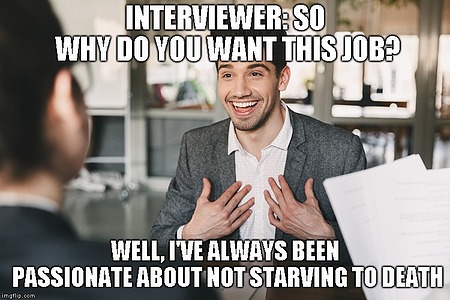Your job application is swallowed up by the World Wide Web, never to be seen again.
You wait anxiously by your phone; hoping to receive a call from an employer you recently interviewed with, but you never hear back.
Your email chimes, indicating you received a new message. You open your inbox only to find a rejection email informing you that the job of your dreams has been offered to another candidate.
Whether you’re a seasoned pro or just beginning your career, rejection is always going to be a part of the job search process. Feeling like you’re in a rejection rut is certainly no fun, and it often causes people’s confidence to plummet. Rest assured, however, I’ve yet to encounter someone who can say they’ve had 100% success over the course of their career.
So, before you start mocking up an invitation to your pity party, try altering your mindset around rejection. Here’s how to face rejection in a way that’ll help you reboot your job search and see the positive opportunity in moments of failure.
Get Answers by Requesting Feedback
I know what you’re thinking: the thought of asking a potential employer why they rejected you feels as cringe-worthy as having “the birds and the bees” talk with your parents. I promise it’s not that bad, and at the end of the day, you’ll be happy you took the plunge.
When you don’t receive a job offer, promotion, or invitation for a second interview, chances are, you have no clue where you missed the mark. While there is a slew of common mistakes people make during the interview process, they rarely invest time in improving their interview skills – even after never hearing back from an employer. The best way to improve your odds of nailing your next interview? Go straight to the source for answers.
What’s the Right Way to Ask?
Rejection can stir up a whirlwind of negative emotions – anger, defensiveness, entitlement, and so on. Make sure you give yourself a day or two to cool down to avoid hitting the hiring manager with a bitter, fury-filled email that’s worthy of going viral. Being respectful and polite when crafting your message is essential. The last thing you want to do is burn bridges or hurt your career in any way by dishing out an insulting email.
In order to receive feedback that could help you develop as a professional, you need to ask the right questions. Open-ended questions are an effective way to get a hiring manager to divulge the nitty-gritty details rather than simply giving you a generic response like, “you weren’t qualified.” Here are three examples of what you could ask:
- What areas could I work on to enhance my performance?
- What type of experience does your ideal candidate have that would fulfill the needs of this role?
- In particular, what should I work on to improve my chances of securing this type of position in the future?
It’s important to refrain from asking about other candidates. Instead, keep your focus centered on the particular aspects of your background/performance that resulted in the company passing on your candidacy. The goal is to uncover nuggets of information that’ll help further your development personally and professionally.
Summon Your Inner Elsa

Feedback is incredibly powerful. While you can’t learn how to write code or manage a team overnight, understanding where you fall short can be translated into actionable steps that you can begin working on straight away. Brainstorm ways you can develop relevant skills and experience in the short term and long term to improve your candidacy moving forward. Whether you opt to enroll in an online course through a site like Coursera, or you decide to seek out a mentor, continually challenge yourself to reach higher and learn more.
Alter your mindset to view feedback as constructive criticism rather than a personal attack on your character. While reading about your weaknesses certainly won’t produce any warm-and-fuzzy feelings inside, if you digest the information with a positive mindset, you’ll find the benefits greatly outweigh the fleeting moment of defensiveness you feel.
When a hiring manager provides you with feedback, convey your gratitude for their time and end the conversation on a positive note. By showing the interviewer that you’re taking initiative and committed to learning from your failures, you’ll leave a pleasant taste in their mouth, and maybe even a lasting impression. They will be much more receptacle (and even impressed) should you try for the position once more down the road after you’ve invested the time in gaining more experience.
Putting Words into Action
The type of information you receive from a hiring manager will ultimately provide you with a roadmap on next steps. If they commented on the absence of a particular skill, or lack of experience with a certain software, seek out further training in those areas to strengthen your resume. There may even be an opportunity with your current employer to take on more responsibility in the areas you need more exposure to.
Maybe they noted that although you had job-specific experience, they are looking for a candidate with knowledge of the industry. If this is the case, there are a number of ways to get involved with an industry, such as attending networking events, volunteering for fundraisers or events, enlisting the help of a mentor in that field, or taking on a part-time position on weekends or after work to fully immerse yourself in the business.
Digesting the Feedback

Don’t forget about accountability. If an employer says you presented yourself in a negative light – for example, bad-mouthing a previous manager, which is a big no-no – take responsibility those slip-ups. Do more than just make a mental note of where you went wrong, make an effort to improve these mistakes. Hold mock interviews with family or friends to practice, read up on best interview practices, and equip yourself with the ammunition you need to confidently nail your next interview.
Never let a ‘no’ derail you from your ultimate goal – it could wind up setting you on an accelerated path to success. Because with every failure, comes an opportunity to learn and grow, so keep on moving forward.

Be First to Comment